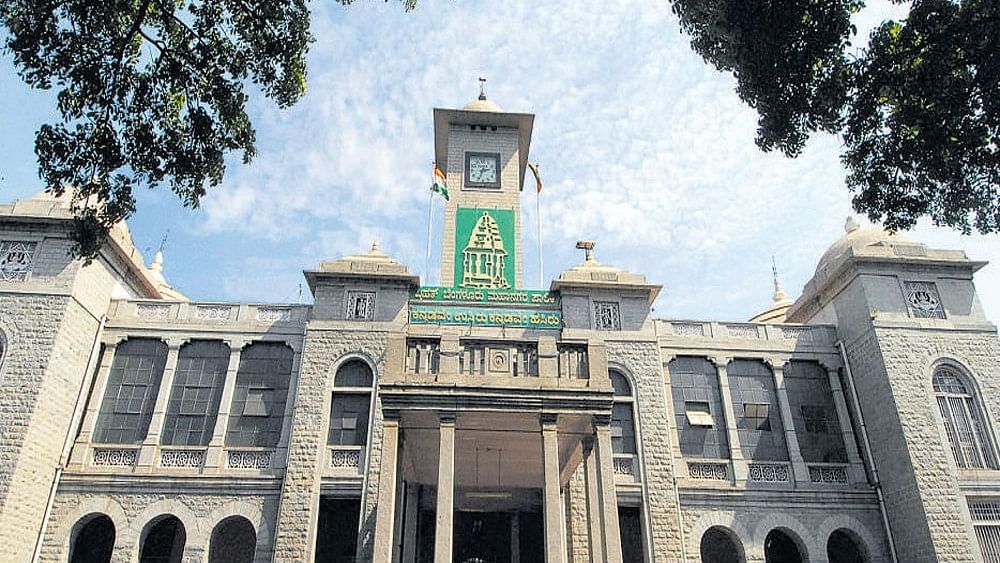
The Bruhat Bengaluru Mahanagara Palike (BBMP) council office.
Credit: DH Photo
The tragedy of an 11-year-old child being killed by a BBMP playground gate falling on him exposes the grim reality of neglect towards public amenities. The boy, son of an auto driver and a student at a Bruhat Bengaluru Mahanagara Palike school, relied on State-funded amenities for his education and daily life.
As reported by the media, the gate was in poor condition, rusted just two years after being installed. While the officers and contractors responsible may be penalised post-facto through suspension from service, this negligence cost the life of a child who depended on the city’s civic infrastructure to live his life. The BBMP has now announced plans to create a separate cell to address playground maintenance.
It is important to acknowledge that no amount of compensation announced by the deputy chief minister and the health minister can truly make up for this loss. The government must do a better job of protecting its citizens. The BBMP and the Government of Karnataka failing their citizens on account of poor infrastructure and civic amenities is not a new story.
There has long been a pattern of neglect when it comes to the maintenance of parks and playgrounds by the BBMP. A 2017 survey by the Janaagraha Centre for Citizenship and Democracy, a non-profit organisation, highlighted the dismal condition of these spaces.
One of the key parameters considered was safety, such as the presence of security guards and proper lighting within the park and playground premises. The survey found that only 36% of the inner ward playgrounds had a security guard, and lighting was inadequate in both parks and playgrounds.
Though the BBMP recently announced that parks would remain open from 5 AM to 10 PM, many ground reports suggest otherwise. Even if the policy were enforced, the issue of subpar safety standards discourages the public from using these civic amenities, which are essential for fostering social interaction in the city. This is especially crucial for children, who need spaces to play, socialise, and interact with others.
The lack of standards
The poor safety and maintenance of parks and playgrounds also reflect a larger systemic governance issue: the absence of clear standards to hold the government accountable. For instance, the relevant law governing parks and playgrounds under BBMP jurisdiction, the Karnataka Parks, Playfields, and Open Spaces Act, 1985 (the KPPO Act), under Section 7 that deals with maintenance, vaguely states that parks should be maintained in a ‘clean and proper’ condition. The rules under the Act do not provide any specific standards for maintaining parks and playgrounds.
The BBMP, under the municipal laws, is also empowered to draft bye-laws for parks, if necessary. Yet, there are no such bye-laws creating a standards checklist for officers on the ground to follow. This glaring lack of standards and regulation leads to ad hoc decisions, like creating a cell specifically for playground maintenance.
It is also important to note that the KPPO Act, 1985, or the Rules have not been amended since its enactment nearly 40 years ago. In contrast, the Delhi Development Authority’s Parks Policy 2019 prescribes minimum standards for maintenance and regular repairs.
This tragedy was entirely preventable had the BBMP done its due diligence in ensuring safety standards at its facilities. It is disgraceful that the public infrastructure becomes a subject of priority for the authorities only when a catastrophe occurs. This can be avoided by conducting regular audits, setting a safety standard checklist, and providing precise budgetary allocations. In 2022, it was reported that the BBMP spent a budget meant for 37 parks on just six. This imprecise resource allocation stems from the absence of a definitive benchmark, leading to a disconnect between actual park maintenance needs and the resources dedicated.
It is also important to read this incident in the context of BBMP elections not having occurred, so there exists no municipal council for the city right now. This means the most reachable political representative within a city does not exist due to non-existent ward committees. Ward committees are, by law, empowered to spearhead park maintenance. Given that they do not exist, the on-ground check mechanism has become harder, leading to a lack of accountability. It is in the government’s hands that a child loses his life for simply trying to live his life, and the answer is not mere monetary compensation and suspension of officers. Parks are meant to be spaces for greenery, health, and social life, not tragic losses of innocent lives.
(The writer is Research Fellow, Vidhi Centre for Legal Policy, Bengaluru.)